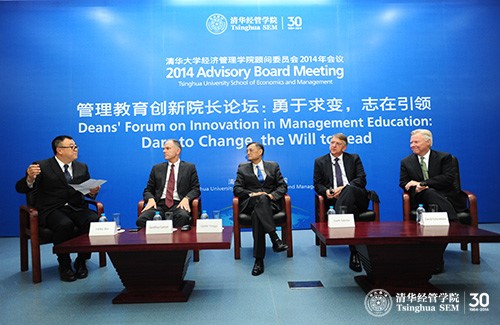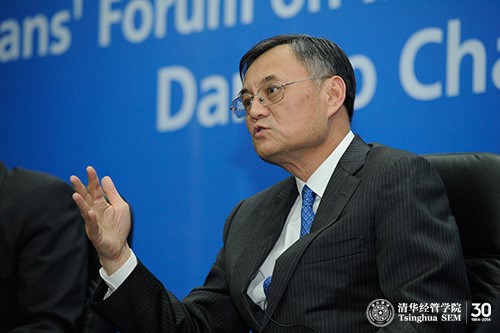
On Oct 23rd 2014, Dean QIAN invited three other Deans from our school’s Advisory Board to a public forum on Innovation in Management:
· David Schmittlein, Dean of MIT Sloan School of Management
· Geoffrey Garrett, Dean of The Wharton School of the University of Pennsylvania
· Garth Saloner, Dean of Stanford Graduate School of Business
Hosted by Professor YANG Bin of Tsinghua SEM, the Deans from four of the world’s top tiers business school explored into the “Innovation of Management Education” with the theme of “Dare to Change, the Will to lead”. Each Dean presented their views on the recent management and innovation in their schools, as well as the schools’ new challenges and future opportunities.
Education management has been dominated by two trains in the previous two decades: globalization since the 1990’s and technology since 2000’s, so what would be the new dominant? Dean Garrett of Wharton has noticed some expansions in the field of infrastructural projects: there is an active participation in private sectors especially in the emerging markets, and an increase in social awareness within the society. Business schools need to act on maximizing the value of innovation in both public and private sectors.
Dean Saloner of Stanford pointed out the change in curriculum since the past 10-15 years. Nowadays the students who enter the Stanford MBA program are already acquired with the basic management knowledge when they join the program, so the MBA curriculum has been constantly evolving: fine-tuning in course design is needed through the adaptation to new corporate models. Dean Saloner named an example that there is a 28% renewal rate of Stanford business school’s elective courses this year. On top of that, there also has been an increase of content circulation online. Online learning is a growing platform spurred by globalization and innovation.
The leading schools are becoming evermore different and unique. Dean Schmittlein of MIT understands the concepts of change in management practice and notices the increase demand in finance and entrepreneurship programs. This also applies to Stanford, as 18% of the students have built startups after their business school.
When the discussions switched to the current challenges of business schools, the Deans agreed on the two: rates of return of MBA programs in Western business schools and the growth of online learning market. Despite the ‘cost’ of an MBA, there is a huge demand of graduates in the growing emerging market, so the rates of return still remain high on a global scale. To compete with the growing trend of online learning, business schools focus on increasing the attractiveness of the campus experience. The schools know that there are many important qualities, such as, personal interactions amongst students and professors, which cannot be learnt online, as the result, on-campus market will remain at its position. Dean Garrett also commented that the things which would keep business schools alive and competitive were the quality of education as well as their strong branding and reputation. The issue of online courses is that online resources rarely matched with those in traditional classes and were inconsistent with the branding of the schools.
Tsinghua SEM, the first university to offer MBA programs in China, is celebrating its 30th anniversary in 2014. Dean QIAN shared that although Tsinghua SEM is still a relatively young school, it is actively learning from the best practices of the top Business Schools. As China is rising to be the second largest economy in the work, Tsinghua SEM focuses on the goal of taking the highest potentials from the young generation and transform them into our future leaders. Students here are most interested in entrepreneurship and finance (investment services and private equity, etc.). Complementing this, Tsinghua X-Lab was set-up in 2013 in collaboration of Tsinghua SEM with 14 other faculties on Tsinghua campus to provide a platform for students to encourage and support partnerships in startups. This endeavor has been highly successful and will continue to assist and motivate the future leaders of all industries.

From Dong Ying Christina Chong, GBMA Class of 2016